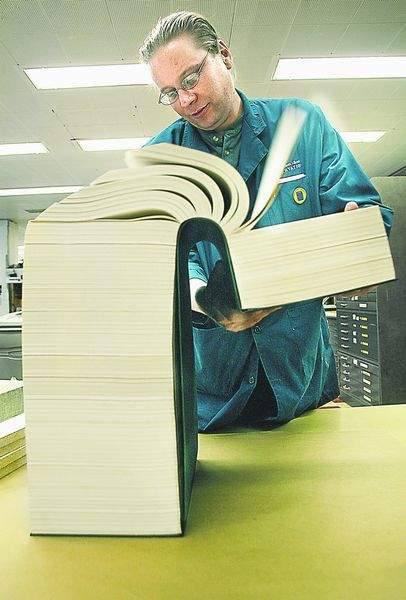Space marine M.C.A. Hogarth has written an interesting LiveJournal post looking into the effect that the physical paper book form factor still has on overall book length, whether electronic or print. The fundamental issue is that writers who like to write long novels can discover that they’ve written a book that’s simply too long for the average person to be able to hold comfortably in his own two hands and read. (You’ll occasionally see oddities like the 10,000+ page Iowa City Poetry Marathon book, by a poet who managed to crank out 100 pages of poetry a day for 100 days, but needless to say, those are definitely exceptions to the rule.)
This is why many long books tend to get split into shorter print books that require a cliffhanger in the middle. It happened to Charlie Stross with his Merchant Princes books, and also to the David Weber “Hell Gate” book I reviewed a few years ago. It’s funny to consider how the length of the average novel has ballooned over the last few decades, isn’t it? You could fit three or four of the old pulps into the length of a fairly slim modern novel.
You would think that the advent of the e-book would mean an end to all that, because it shouldn’t matter how long an e-book is—you can carry as many books as you want in your e-reader, tablet, or smartphone. And that’s why we’ve ended up with some ridiculously-long series-length e-omnibuses, such as the 15-in-1 Wheel of Time and the 7-in-1 Harry Potter e-books.
But the problem is reader confusion. It’s confusing enough already when some long-running series get re-issued in omnibus format—why confuse readers from the very outset by coming out with a single e-book but two differently-titled print books? And would the audiobook follow the print or e-book format and title? Even books Hogarth issues only in e-book format have to follow the length convention set down by print books, because she might want to release them in print someday.
So, not only does print’s physical form factor affect the length of books that can be published in print, it indirectly affects the length of books that can be published electronically. And it looks like it’s going to keep right on doing that for as long as print is still a thing.
(Found via The Passive Voice.)


Pricing, royalties, and profit are also factors in book length. J. R. R. Tolkien wrote The Lord of the Rings as six books. Unwin, his first publisher, combined each pair into a single v0lume, making the publication count three.
Unwin himself explained why. He considered it a work of genius, but the concept of a complex fantasy world was so new, that he didn’t think it would make money. He was doing it because it needed to be published, profits or not. (Good publishers do that, and its why copyright and profit aren’t evil as the “thought wants to be free” zealots claim.) Spliting it into three parts would make each reasonable priced, at least for a hardback in the 1950s. Since he could assume that only those who’d bought and read the first volume would buy the second, that reduced the risk of printing too many copies of the second and third volumes.
The hardback edition sold well enough, that Unwin launched an American edition, but unfortunately blundered and didn’t follow the intricacies of American copyright law at the time. Technically, the American copyright was lost. Seeing their chance, a scifi publisher called Ace released a cheap paperback version. That’s when LOTR took off with students, hippies and scifi/fantasy readers.
Tolkien countered by including a small note in each of his letters to American fans, asking them to boycott Ace. That boycott grew enough that Ace dropped their LOTR and, while not admitting guilt, paid Tolkien money in lieu of royalties. It actually took until the 1990s, a Tolkien estate lawyer told me, to fully restore the LOTR copyright in law.
Along the way to publication, Tolkien and his publisher debated a number of different names for the six books and three volumes of the series. At the end of my booklength LOTR chronology, Untangling Tolkien, I list all the titles considered and adopted. If you’re interested you might either get or copy or get your local library to get one. It is a quite useful reference and describes what every major character is doing on every day in the tale.
–Mike
LikeLike